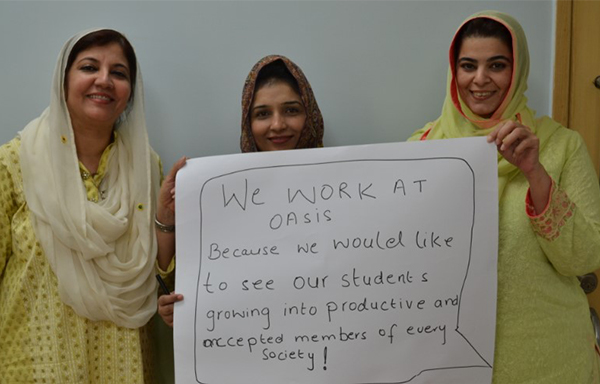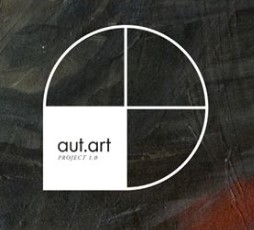Spotlight on autism around the world: Oasis School in Pakistan

By Scot Greathead: consultant speech and language therapist
In just 10 years, Oasis School has changed the landscape of Autism Education in Pakistan. They have forged a unique combination of relationships with Facebook, Pakistan’s celebrities, and the founders of the SCERTS Model and the TEACCH framework to create a vision of a more inclusive society in Pakistan…
Changing perceptions of autism in Pakistan
The school was founded by the mother of an autistic boy and their first ‘classroom’ was in the back of an office with just two children! Over ten years it has flourished into a thriving community of over 50 local teaching and therapeutic professionals, supporting 36 students and their families. Students range from 4 years through to 22 years old and are taught in a specially built school in Lahore. The school not only provides children and families with evidence-based educational support but also aims to change the way that the whole of Pakistan understands the challenges and values the abilities of autistic people. Recently, one of Lahore’s most prestigious galleries hosted an exhibition of Oasis student’s artwork. This hugely successful, week-long exhibition was celebrated by many of Pakistan’s well-known celebrities who shared the unique artistic talents of Oasis students with over 5 million of their Instagram followers. You can view the impressive ‘artwork’ on Instagram by finding the hashtag #AutArt
What is the school like?
The school is a vibrant community of many different professionals. The SCERTS Model and The TEACCH Framework have been hugely influential and all of the classrooms have visual supports that would be the envy of any classroom in the UK. Supports like The Zones of Regulation, picture timetables and zoned classrooms all feature prominently, as do approaches like Attention Autism. There is a strong emphasis on functional educational skills and the school has an enterprising community with its own allotment, supermarket stall, craft room, and retail outlet. It’s not unusual to walk around the school and see students playing adapted PE games, whizzing around on Segways, making juices to share, completing maths assignments or making beautiful handmade paper notebooks.
A ‘global family’ of professionals
In Pakistan, there is sadly a shortage of teachers, speech and language therapists, occupational therapists and psychologists to support autistic children. To manage this, Oasis School has adopted a global view and has invited professionals from across the world to collaborate with them. They regularly hold online seminars with educational experts from Britain and America. More recently, they have partnered with Facebook’s sister site ‘Workplace’ to link speech and language therapy students from the University of Greenwich with Oasis teachers. It’s a true example of a transcontinental, 21st-century partnership, collaborating online without ever meeting face to face. Teachers upload videos of children onto Workplace’s secure platform and the UK team, 4,000 miles away, view and make recommendations on how communication and learning supports might be built into the activities. The relationship is mutually beneficial and both groups collaborate using The SCERTS model to set and evaluate goals, whilst gaining rich insights into each other’s culture.
What next…?
The future looks promising for the students at Oasis school… there are new partnerships in the pipeline to give them educational and employment opportunities beyond their school. The next ten years will be an exciting time for the school as they continue to share their vision of a more inclusive society for autistic people in Pakistan. Please support Oasis School and be part of their journey by joining their community on Facebook and Instagram

WE ASKED AYESHA AND SAMRINA, THE FOUNDER AND HEADTEACHER OF OASIS SCHOOL A FEW QUESTIONS
Why did you set up the school?
Ayesha: It was my autistic son who became my inspiration to open the school. It began as a mother’s dream but it has become a woman’s quest to empower all mothers who have special children and fight multiple battles.
Samriina: Thus, Oasis was set up as a world in which autistic children will flourish.
‘What were the first few years like?’
Ayesha and Samrina: It was a rollercoaster ride! We looked at all the special schools in the city and saw they offered nothing for autistic children. The biggest challenge was finding skilled professionals to work with us and a lack of acceptance and denial in parents
Tell us something that you’re most proud of
Ayesha: I am most proud of the journeys that the students and their parents have made with us. We have seen young children say their first words and a teenager take their first steps. It is these beautiful moments that remind us why I created this Oasis. I also take pride in the fact that one of our most valued team members is a 25-year-old autistic male, working successfully at Oasis.
Why is being part of a global community important to you?
Ayesha: My path from a mother to a professional striving from every corner of the world has been a tough, but rewarding one. Being part of this global community of Autism specialists is a culmination of this journey for knowledge. Moreover, it is an opportunity for both general and cross-cultural learning to benefit both Oasis and other institutions.
What’s your vision for the future?
Samrina: No child should be marginalised or left out and we have just started an outreach programme to help schools support autistic children in mainstream schools.
Facebook @OasisSchoolforAutismPakistan
Instagram @OasisSchoolForAutism